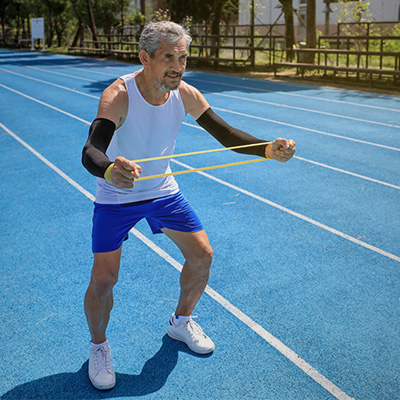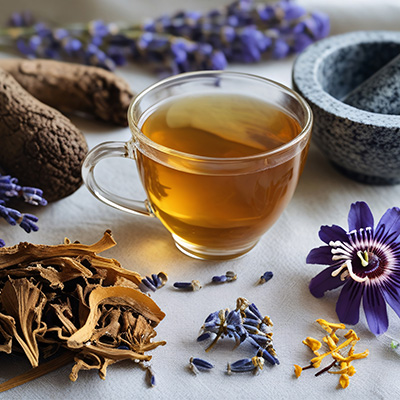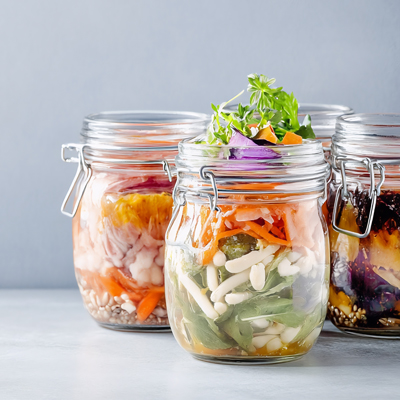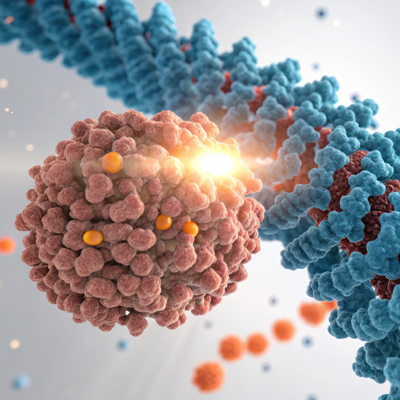Vitamins
All information about "Vitamins" and the related magazine articles can be found here.
Our articles are written clearly and link to scientific studies where relevant. This is how we meet our own standards: we regularly deliver new, high-quality content for you—free of charge, no sign-up required, with the highest possible benefit to you.

Your rest compass for the summer: Naturally in balance with saffron.
Gentle support from nature for mental serenity and your well-being
Does your inner rhythm sometimes falter in the hustle and bustle of everyday life and does your serenity wane? With saffron, nature offers a valued way to harmonize the carousel of thoughts and cultivate your inner center. Discover here how the red gold can lead you back to new balance and lightness.

Inner peace for hot days, with GABA and rose root extract
Support your nervous system with herbal active ingredients that can reduce stress, stabilize your mood and promote your mental balance even in the summer heat.
Summertime often brings stress due to heat, travel or busy schedules. GABA and the adaptogenic rose root extract help you to get through the summer more calmly by promoting your stress resistance and inner peace. So you can enjoy your emotional balance and greater well-being.

Light legs, light day. How horse chestnut, vitamin C and OPC help against heaviness
Discover how proven plant extracts and vitamins can relieve the feeling of heavy legs. For more lightness in everyday life for mom, grandma & co.
Heavy legs after a long day? Horse chestnut, vitamin C and OPC can promote blood circulation, strengthen the veins and noticeably relieve the feeling of tired, weighed-down legs. Ideal for anyone who stands a lot, walks a lot or simply wants to stay active in everyday life. Whether mom is out shopping or grandma is out for a walk. Find out how these natural active ingredients support your leg health and give you new lightness.

Mental strength in summer?
Ashwagandha and roseroot help you stay calm and alert on hot days
Summer brings light, energy and sometimes a lot of stress. So it's a good thing that nature has two herbal allies in the form of ashwagandha and roseroot, which can promote mental balance and resilience. Find out more!

Rescue for cozy summer evenings
Natural mosquito repellent with vitamin B1 & essential oils
Whether it's a garden party or an evening stroll: as soon as it starts buzzing, the mood is gone. Vitamin B1 and essential oils such as citronella or lavender can help to gently keep mosquitoes away. How does this work? Read here how natural remedies ensure carefree summer evenings.

Summer, sun, full concentration!
How phosphatidylserine and omega-3 can boost your concentration
The sun is shining but your concentration is waning? Discover how phosphatidylserine and omega-3 fatty acids can naturally boost your mental performance.

Relaxed baby bump: Natural support with inositol, folic acid, cranberry & D-mannose
Balance and well-being for women who want to have children or during pregnancy
Wanting to have children or already pregnant? A lot changes during this special phase. Smart nutrients such as inositol, folic acid, cranberry and D-mannose can provide targeted support: They promote hormonal balance, strengthen the urinary tract and bring more balance to everyday life. Find out now how you can do something good for yourself naturally.

Start your vacation full of energy with potassium & magnesium citrate
How to keep you and your family fit, active and balanced even in the heat
On summer vacation, electrolytes such as potassium and magnesium quickly become unbalanced. This can affect energy, muscles and concentration. Find out here how you can strengthen your inner balance with smart nutrition and targeted supplements.

Strong heart, strong life. Promoting men's health naturally
Gain new energy and vitality with coenzyme Q10, chokeberry as a medicinal plant and targeted care for the cardiovascular system.
The heart is the engine of your life - and men in particular should pay special attention to it. Find out how you can use the effects of coenzyme Q10, the healing power of the aronia berry and a healthy lifestyle to strengthen the function of your cardiovascular system and support your overall health as a man.

When the hormone balance changes
Gentle nutritional support through the menopause
The menopause changes many things - both physically and emotionally. Myo-inositol, vitamin D3 and magnesium can help to boost your well-being, support your metabolism and activate new sources of energy. Find out more here!

Comfort food for super moms
Choline, lecithin & vitamin B12 - powerful micronutrients for a strong pregnancy
Did you know that certain nutrients can have a positive effect not only on your well-being, but also on your baby's development? Choline, lecithin and vitamin B12 are little helpers with a big effect - for strong nerves, clear thoughts and a good gut feeling during this special time.

Playground power for every day
Calcium & vitamin K2: For bone health that grows with you
Whether romping around with the children or the daily balancing act between job and family - strong bones are the stable foundation. Find out how calcium and vitamin K2 can playfully help to strengthen your bones.

Naturally powerful: Turmeric, boswellia & ginger
Learn how to gain more zest for life with plant power
Plant-based active ingredients can help to reduce inflammation and make everyday life more active and mobile - whether in the garden, during sport or on a family outing.

Finally sleep well again - even in summer!
Discover natural sleep aids with melatonin, passion flower & co.
Is the summer light depriving you of sleep? We show you how you can support your sleep-wake rhythm with natural remedies such as melatonin and passionflower.

Sun protection from within - with the power of vitamin A, astaxanthin and omega-3
Strengthen your skin with natural nutrients that reduce oxidative stress, soothe inflammation and prevent premature ageing.
The first rays of sunshine are here - but your skin is particularly sensitive after the winter. Discover how vitamin A, the antioxidant astaxanthin and essential omega-3 fatty acids can protect your skin from the inside out and optimally prepare it for UV radiation. For a radiantly healthy complexion and effective anti-ageing support.

Spring cleaning for the body!
Drain naturally - with nettle, dandelion & potassium
Find out more about dandelion, stinging nettle and potassium to gently drain your body and get back on track with ease!

Naturally against allergies - Black cumin oil and quercetin in use for your well-being
Gentle support from nature for hay fever, pollen allergies and allergic reactions
Itchy eyes, sneezing attacks and constant pollen stress? Black cumin oil and quercetin offer natural help for allergic symptoms. Find out how the two herbal active ingredients work, when it is the right time to use them and what you should look out for when choosing them.

Strong through the pollen season with omega-3 and vitamin E
How to strengthen your child's airways
When pollen irritates the airways, it can quickly become unpleasant for children. Find out why omega-3 and vitamin E can not only support but also prevent and how you can easily incorporate the two substances into your everyday life!

Fit for spring: Stimulate metabolism with inulin, probiotic foods & intestinal cure
Intestinal cleansing for better digestion, the natural effects of inulin and the benefits of probiotic foods for your metabolism
Get a vital start to spring and bring your body into balance - with targeted nutrition that boosts your metabolism, supports digestion and rebalances your gut with the help of a gut cleanse, inulin and probiotic foods. Find out how to boost your gut health and gain new energy - from the inside out!

New cell energy with B vitamins, NADH and alpha lipoic acid
NADH, alpha lipoic acid and B vitamins play a central role in human metabolism for energy, concentration and cell protection.
Discover how these nutrients support the body against exhaustion, oxidative stress and loss of performance - for more vitality and mental strength in everyday life!

Sleep better with lemon balm, passionflower and L-theanine
These natural helpers bring peace to your evening
Sleep disorders? Stress in the evening? Herbal helpers such as lemon balm, L-theanine and passionflower can gently support the sleep-wake rhythm and help you to finally calm down. Read the article now to find out how you can harness the power of nature for restful nights.

Spring fever for the soul
Naturally more balance with 5-HTP, L-tryptophan and vitamin B6
The sun is shining - but everything still feels heavy inside?
These three mood boosters gently help you arrive in spring: for more rest, sleep and stability. Find out more here!

Building inner strength - more relaxed through spring
Plant adaptogens for more balance, energy and mental freshness
Spring is the perfect time to recharge your batteries and do something good for yourself. Rhodiola and cordyceps provide natural and effective support. Find out more here!

Strengthen your immune system with rockrose, zinc and vitamin C
Natural support for your immune system
Cistus, zinc and vitamin C can provide your body with valuable support in moody weather. Find out how these three building blocks gently strengthen your defenses and give you more well-being in everyday life.
Vitamins - essential for our health
Vitamins play a crucial role in our health and well-being. They are essential nutrients that our body needs to function optimally. But what different vitamins are there? Which foods contain them? And what functions do the individual vitamins have? We take a closer look at these and other questions in this article.
The 13 known vitamins
There are a total of 13 known vitamins that are essential for the human body. These can be divided into two main groups: fat-soluble and water-soluble vitamins.
Fat-soluble vitamins
The fat-soluble vitamins include:
- Vitamin A
- Vitamin D
- Vitamin E
- Vitamin K
These vitamins can be stored in the body's fatty tissue and therefore do not need to be taken daily.
Water-soluble vitamins
The water-soluble vitamins include:
- Vitamin C
- B vitamins: B1, B2, B3, B5, B6, B7 (biotin), B9 (folic acid), B12
In contrast to fat-soluble vitamins, these cannot be stored in the body and must be taken in regularly through food.
What is the importance of the individual vitamins for humans?
Each vitamin has specific functions in the body. We will now take a closer look at what these are.
Vitamin A
Vitamin A, also known as retinol, is important for the production of testosterone and sperm cells, making it a significant factor in reproduction. It also promotes healthy bones, teeth and cartilage and is essential for the development and regeneration of the skin. The daily requirement for vitamin A varies according to age and gender, but is generally between 0.8 and 1.1 milligrams in the form of beta-carotene (which is converted to vitamin A in the body).
Vitamin D
Vitamin D is often referred to as the sunshine vitamin, as it is the only vitamin that can be produced by the body itself with the help of sunlight. It is crucial for a positive mood, a strong immune system and healthy bones and muscles. It also contributes to a healthy cardiovascular system. The daily requirement for vitamin D is around 20 micrograms [1].
Vitamin E
Vitamin E acts as a powerful antioxidant with anti-inflammatory properties. It is important for memory, healthy blood vessels and the immune system. Adults should consume between 11 and 15 milligrams of vitamin E daily. [2]
Vitamin K
Vitamin K is primarily known for its importance in blood clotting, where it is involved in the activation of several clotting factors. Vitamin K also has an important influence on bone metabolism. It activates the protein osteocalcin, which is essential for new bone formation and bone remodeling. The daily requirement for vitamin K varies according to age and gender, with good sources being green vegetables for vitamin K1 and animal products for vitamin K2. An adequate supply of vitamin K is particularly important for bone health, especially in older people, to reduce the risk of osteoporosis and bone fractures.
Vitamin C
Vitamin C is known as the all-rounder for the immune system. It not only strengthens the body's own defenses, but also supports the formation of bones and cartilage. Vitamin C also improves the absorption of iron from plant foods and acts as an antioxidant by scavenging free radicals and thus protecting the cells. It also plays a supporting role in wound healing. The average daily requirement of vitamin C is around 100 milligrams, which can easily be met by eating a large orange or 75 grams of currants [3].
B-vitamins
B vitamins are essential for the production of energy from carbohydrates and proteins and support many bodily functions:
- Vitamin B1 (thiamine) is crucial for energy production and supports the nervous system and muscles.
- Vitamin B2 (riboflavin) is known as an energy vitamin and supports the production of energy from fat, protein and carbohydrates as well as the burning of fat.
- Vitamin B3 (niacin) promotes energy production, has a positive effect on thinking and memory and can help to reduce tiredness.
- Vitamin B5 (pantothenic acid) is an important component of the coenzyme CoA and is required for the breakdown of carbohydrates, fats and amino acids.
- Vitamin B6 (pyridoxine) contributes to normal energy, protein and glycogen metabolism and supports normal nerve function.
- Vitamin B7 (biotin) is involved as a coenzyme in the conversion of nutrients into energy and ensures a functioning protein and fat metabolism.
- Vitamin B9 (folic acid) is important for athletes as it contributes to the normal functioning of the metabolism of various nutrients.
- Vitamin B12 plays an important role in the formation of red blood cells, the function of nerve cells and cell division and also has an influence on our psyche.
What is the daily vitamin requirement?
There is no general answer to the question of which vitamins you should take every day. Individual requirements depend on various factors such as age, gender, lifestyle and state of health.
A healthy, varied diet with plenty of fresh fruit, vegetables, wholegrain products, lean meat and fish generally provides all the vitamins you need. Experts recommend:
- Three portions of vegetables and two portions of fruit daily
- Regular consumption of wholemeal and dairy products
- Spend time outdoors to stimulate the body's own vitamin D production
Special situations and risk groups
In special situations and for risk groups, additional vitamin supplementation may be necessary:
- With a vegetarian or vegan diet, for example, it is important to pay particular attention to the supply of vitamin B12, as this is mainly found in animal products.
- Pregnant and breastfeeding women have an increased need for folic acid to prevent developmental disorders in the fetus.
- Additional intake may also be necessary in the case of certain illnesses that impair vitamin absorption.
- Targeted vitamin supplementation can also be important for competitive athletes. Intensive physical exertion and an increased metabolism increase the need for certain vitamins, especially the water-soluble B vitamins and vitamin C. These vitamins are increasingly lost through sweat and urine. These vitamins are increasingly lost through sweat and urine. Supplementation may also be advisable for athletes who have a high carbohydrate diet with a low micronutrient density or who exclude certain food groups.
In allen Fällen ist eine ärztliche Beratung ratsam, wenn Sie Nahrungsergänzungsmittel wie einem Vitamin-B-Komplex, Multivitamin oder anderen Vitamine von A-Z einnehmen möchten, weil ein Arzt Ihren individuellen Bedarf ermitteln kann. Das gilt insbesondere dann, wenn die Einnahme hochdosiert erfolgen soll.
The role of vitamins for the metabolism
Vitamins play a crucial role in metabolism and are essential for many vital functions of the body. They are not only involved in numerous metabolic reactions and regulate the utilization of carbohydrates, proteins and minerals, but also act as cofactors for enzymes that are responsible for the build-up and breakdown of substances in the body.
B vitamins are particularly important for energy metabolism: vitamin B2 (riboflavin) triggers energy production from carbohydrates and fat. Vitamin B6, on the other hand, is involved in muscle building and the conversion of amino acids.
Vitamin C supports fat burning by promoting the production of noradrenaline and carnitine. Vitamins also influence the hormone balance, such as the production of thyroid hormones, which regulate the metabolism [4]. Last but not least, they support the immune system and are important for the formation of cells, blood cells, bones and teeth as well as for the function of enzymes that ensure a smooth metabolism in the cells.
Vitamin-rich foods: natural sources for your health
To provide your body with an optimal supply of vitamins, you should eat a varied and balanced diet. The following foods are particularly helpful here:
- Vitamin A: carrots, sweet potatoes, spinach, mangoes
- Vitamin D: Fatty fish (e.g. salmon, mackerel), egg yolk, mushrooms
- Vitamin E: Nuts and seeds, vegetable oils (especially wheat germ oil), avocados
- Vitamin K: kale, spinach, broccoli, Brussels sprouts, parsley, rocket, chives, chickpeas, lentils, rapeseed oil
- Vitamin C: citrus fruits, peppers, broccoli, acerola cherries
- B vitamins: Whole grain products, legumes, meat and fish, eggs, dairy products
Vitamins and the immune system: a strong team
Vitamins help to strengthen and maintain our body's own defenses. Vitamin C is particularly important here. It not only supports the function of white blood cells, our immune cells, but also acts as a potent antioxidant that protects our cells from harmful free radicals [5].
Vitamin D has proven to be an important modulator of the immune response. Studies show that an adequate supply of vitamin D can reduce the risk of infections. This underlines the importance of adequate vitamin D intake, especially in regions or seasons with little sunshine.
Vitamin E also makes an important contribution to immune defense. As a powerful antioxidant, it protects our cells from oxidative stress and thus supports the body's general resistance to pathogens.
Vitamin A is also important for our mucous membranes.
Vitamins in combination
Vitamins should not be considered in isolation, as they often only develop their full effect in combination with other nutrients. One of the best known and most important interactions is between vitamin D and calcium. Vitamin D plays a crucial role in the absorption of calcium in the intestine and is therefore essential for keeping our bones healthy. Without sufficient vitamin D, the body would not be able to optimally utilize the calcium it absorbs, which could lead to reduced bone density in the long term.
Vitamin C and iron also work well together. Vitamin C significantly improves the absorption of iron, especially from plant sources. This is particularly important for vegetarians and vegans, but also for anyone else who wants to optimize their iron intake.
Vitamin E and omega-3 fatty acids also work best together. Omega-3 fatty acids are known for their numerous health benefits, but are also very sensitive to oxidation. This is where vitamin E comes into play: as a powerful antioxidant, it protects the valuable omega-3 fatty acids from oxidative damage and thus maintains their effectiveness. This combination is particularly relevant for heart health and the function of the nervous system [6].
Trace elements such as zinc and selenium also work closely with vitamins to fulfill various important functions in the body.
Special vitamin requirements at different stages of life
Vitamin requirements can change depending on the phase and situation of life:
Pregnancy and breastfeeding
The need for many vitamins is increased during pregnancy and breastfeeding. These are particularly important:
- Folic acid: to prevent neural tube defects in the unborn child
- Vitamin D: for the development of the baby's bones
- Vitamin B12: for the development of the nervous system
Childhood and youth
- Vitamin D: for healthy bones
- Vitamin A: for growth and development
- B vitamins: for energy and the nervous system
Seniors
In old age, the need for certain vitamins can increase, while absorption is often more difficult:
- Vitamin D: for the prevention of osteoporosis
- Vitamin B12: as absorption is often impaired in old age
- Antioxidants (vitamin C, E): to protect against age-related diseases
How can I recognize a vitamin deficiency?
Vitamin deficiency can manifest itself through various symptoms and should be taken seriously. Common signs include persistent tiredness, increased susceptibility to infections, problems with skin and hair and difficulty concentrating. However, these symptoms can also have other causes, which is why a visit to the doctor is advisable if a vitamin deficiency is suspected. The vitamin status can be determined precisely by means of specific blood tests. A balanced and varied diet is the key to preventing a vitamin deficiency.
Vitamins and disease prevention
Vitamins play an important role in the prevention of various diseases:
- Cardiovascular diseases: Vitamins C and E as antioxidants can reduce the risk
- Osteoporosis: Vitamin D and K are important for bone health
- Cancer: Antioxidants such as vitamin C, E and beta-carotene may be able to reduce the risk of certain types of cancer. However, experts are skeptical about this [7].
- Eye diseases: Vitamin A is essential for eyesight.
Vitamins are little helpers with a big effect
Vitamins are essential nutrients that play a central role in our health and well-being. They support numerous bodily functions, strengthen our immune system and our nerves and help us to remain efficient and vital.
Food supplements (in capsule, tablet or powder form) can be useful in certain situations. But remember: they are never a substitute for a healthy lifestyle and diet.
Sources
[1] https://www.rki.de/SharedDocs/FAQ/Vitamin_D/Vitamin_D_FAQ-Liste.html
[2] https://www.aok.de/pk/magazin/ernaehrung/vitamine/vitamine-wichtig-fuer-das-immunsystem-und-die-abwehrkraefte/
[3] https://www.aok.de/pk/magazin/ernaehrung/vitamine/vitamin-c-wie-viel-brauchen-wir/
[4] https://www.schilddruesenpraxis.at/spurenelemente-schilddruese.html
[5] https://pubmed.ncbi.nlm.nih.gov/29099763/
[6] https://pubmed.ncbi.nlm.nih.gov/33445534/
[7] https://www.krebsgesellschaft.de/onko-internetportal/basis-informationen-krebs/bewusst-leben/basis-informationen-krebs-bewusst-leben-ernaehrung/mit-vitaminen-kre.html
